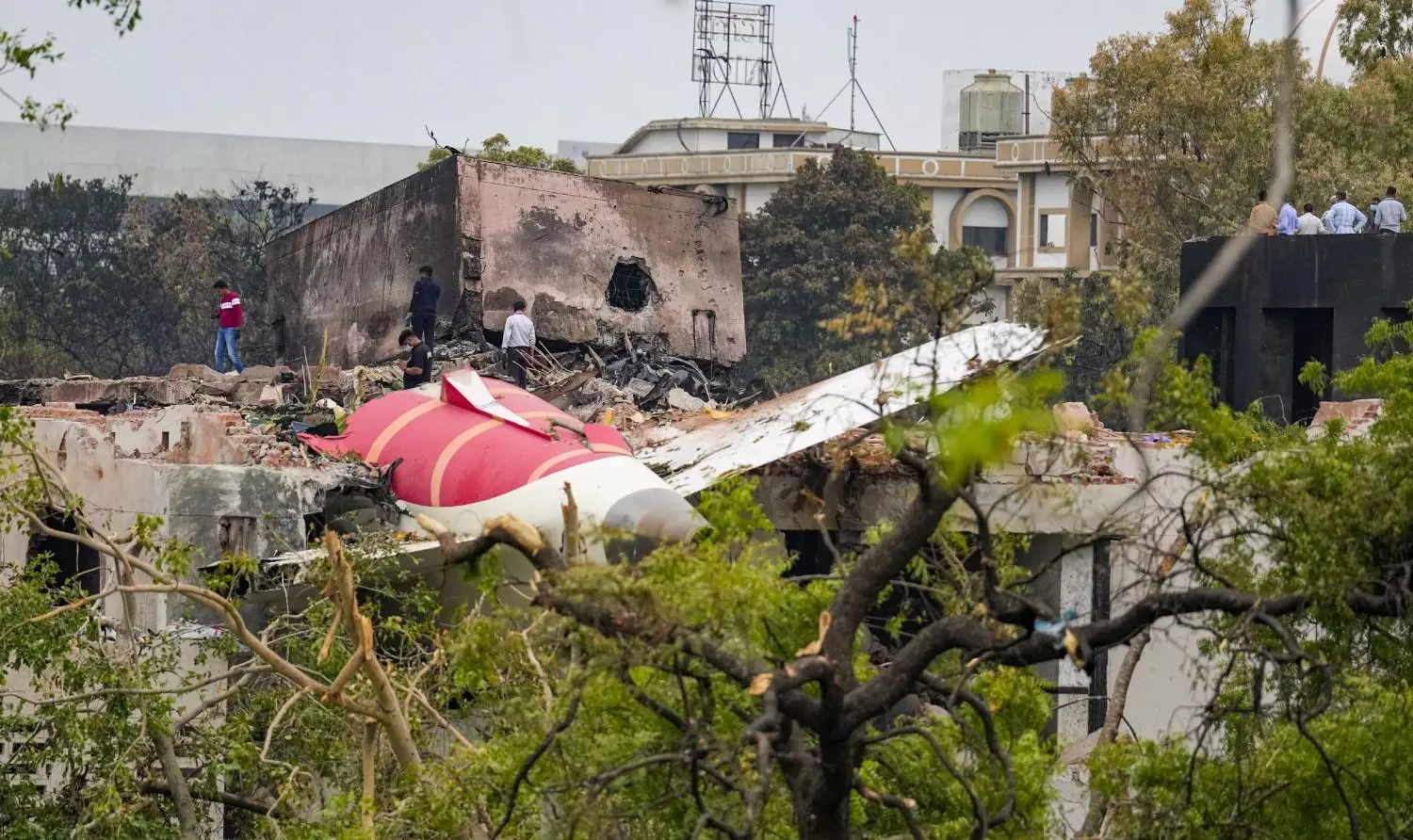
Air India crash: WSJ report puts lens on captain; pilots’ body questions findings
Recording seems to suggest Captain Sabharwal cut fuel to engines seconds after takeoff; Federation of Indian Pilots voices concern over preliminary report

A recording of the discussion in the cockpit between the two pilots of the Air India flight that crashed in Ahmedabad on June 12 shows that the captain cut the flow of fuel to the plane’s engines, reported the Wall Street Journal on Wednesday (July 16).
The publication quoted sources familiar with US officials’ assessment of evidence that has been uncovered during the probe into the crash of the Boeing 787 Dreamliner in Ahmedabad.
No conclusive evidence
In the preliminary report released last week by India’s Aircraft Accident Investigation Bureau (AAIB), it said one pilot was heard on the cockpit voice recorder asking the other why he cut off the fuel, and the other pilot replied that he did not do so.
The investigators did not say in the report which remarks were made by Captain Sumeet Sabharwal and which one by First Officer Clive Kunder.
WSJ reported that Kunder was flying the plane, and he asked Sabharwal why he moved the fuel switches to the “cutoff” position. This exchange between the two pilots occurred seconds after the plane lifted off from the runway.
Also Read: AI finds no issues with fuel control switch locking in B787 planes: Report
Other than this verbal exchange between them, the newspaper did not say if there was any evidence that Sabharwal did move the fuel switches’ position.
But the journal quoted US pilots who have read the preliminary report as saying that Kunder, the pilot who was actively flying the plane, would have probably been too busy pulling back on the plane’s controls at that stage of the flight to have the time to move the fuel switches.
It had been reported earlier that the other pilot said in reply that he had not moved the fuel switches.
Loss of power
CCTV footage showed that almost immediately after the plane took off from the runway, a backup energy source called a “ram air turbine” had deployed, which indicated a loss of power from the engines.
The plane then began to lose thrust, and started to sink after reaching a height of 650 feet.
Also Read: Air India CEO says report found no mechanical fault as Etihad orders fuel switch check
The report said that the fuel switches for both the engines were turned back to the “on” position, and the plane automatically tried to restart the engines. But the plane was too low and too slow to be able to recover, according to Reuters quoting aviation safety expert John Nance.
‘No mechanical, maintenance faults’
Air India CEO Campbell Wilson in an internal memo on Monday (July 14) wrote that the preliminary report found no mechanical or maintenance faults and that all required maintenance had been carried out.
The preliminary report did not give any safety recommendations to the engine manufacturer GE or to Boeing.
Boeing and the US Federal Aviation Administration privately issued notifications after the preliminary report was released saying that the fuel switch locks on Boeing planes are safe, reported Reuters.
Also Read: AI replaced Throttle Control Module in crashed plane twice on Boeing order
The aviation expert Nance said there was “no other rational explanation that was consistent with the information released to date”, and that the circumstantial evidence indicates that one of the crew members flipped the engine fuel switches.
He, however, said the investigators will have to probe all the factors and rule out other possible contributing factors.
Under international rules, a final report is expected within a year of an accident.
Debate over flight deck cameras
There has been a renewed debate in aviation circles, after the Air India crash, about adding flight deck cameras, called “cockpit image recorders”, on planes.
Nance said the investigators would have probably benefited greatly if they could have had access to video footage of the cockpit during the flight.
Pilots’ body voices concern over report
The Federation of Indian Pilots (FIP) on Wednesday (July 16) expressed “concern regarding the preliminary findings and the public discourse surrounding the tragic crash of Air India flight AI171 in Ahmedabad.
“We register our dissatisfaction with the exclusion of pilot representatives from the investigation process. We also firmly object to how the preliminary report has been interpreted and presented publicly,” said the FIP in an official statement.
Also Read: What India, and the world, can learn from AI-171 Dreamliner crash report
The pilots’ body criticised the report for lacking comprehensive data and for relying heavily on “selectively paraphrased cockpit voice recordings” that appear to imply pilot error and question the competence of the flight crew.
The FIP urged its members and the public not to draw conclusions prematurely, and said this approach is “neither objective nor complete”.
'Pilots deserve respect'
Meanwhile, the Air Line Pilots' Association - India (ALPA India) has said that the pilots of the crashed Air India flight AI 171 deserve respect and not unfounded character judgment as till they tried to protect the passengers.
"Pilots are trained professionals who carry the responsibility of hundreds of lives with dedication and dignity,” stated ALPA India.
"The crew of AI 171 made every possible effort-till their very last breath-to protect the passengers on board and minimise harm on the ground. They deserve respect, not unfounded character judgments," they added.

